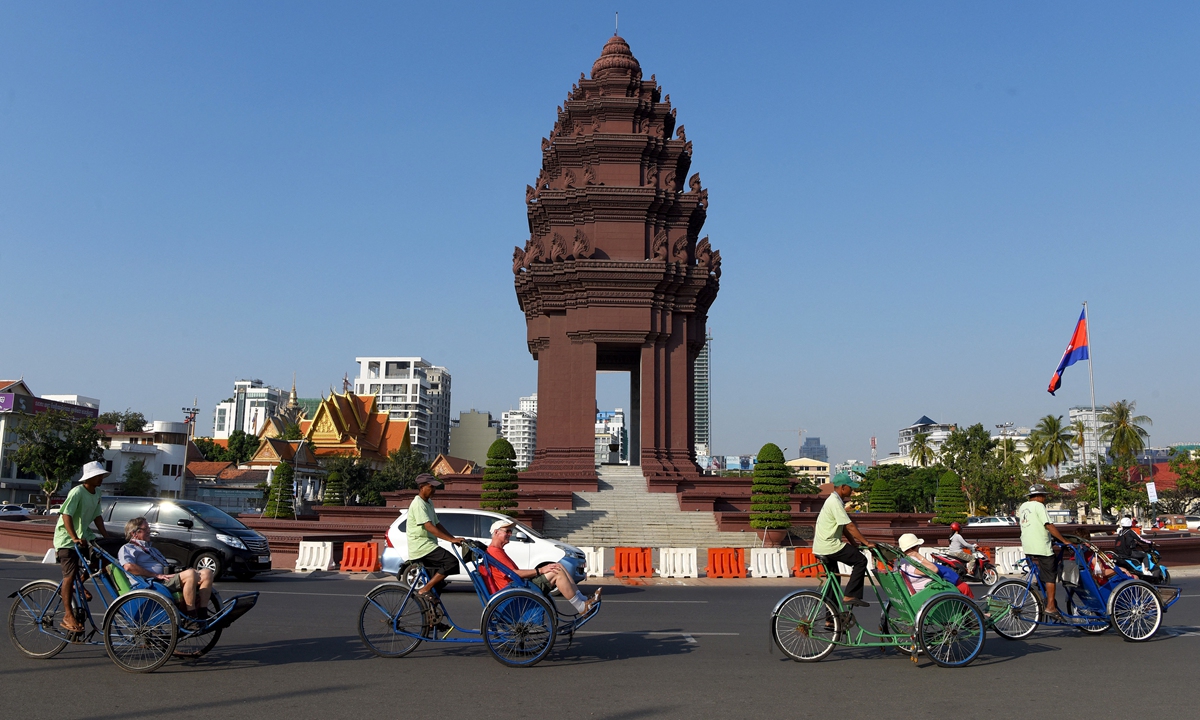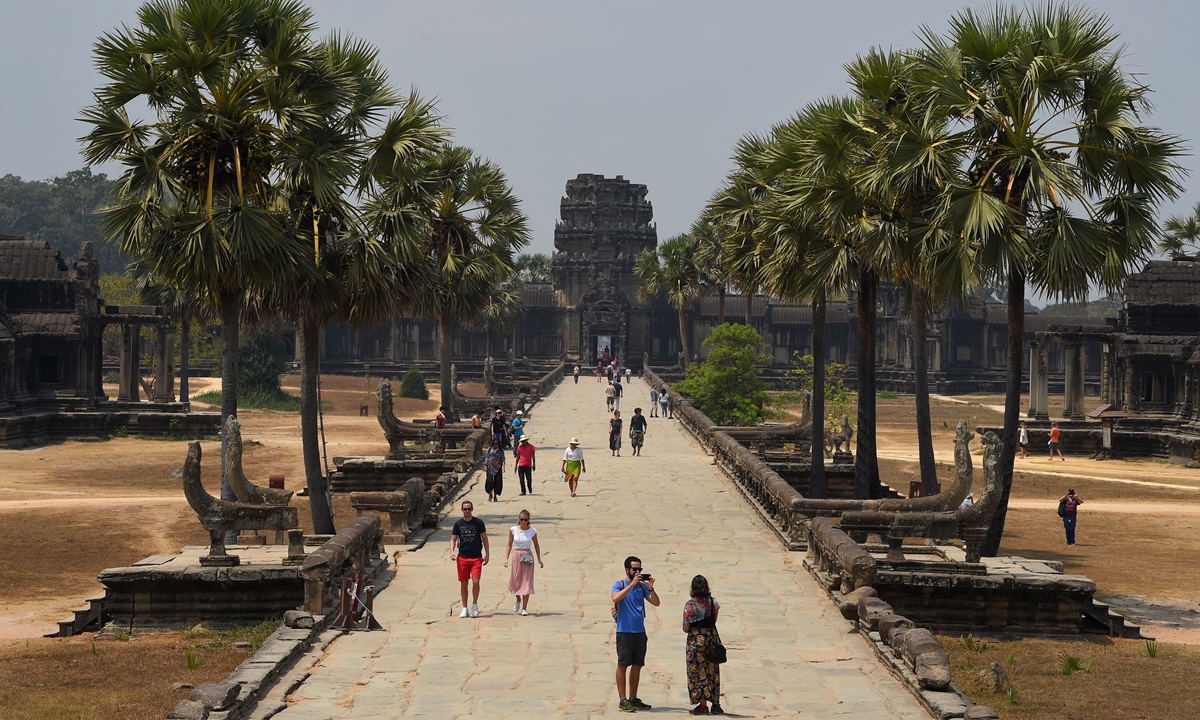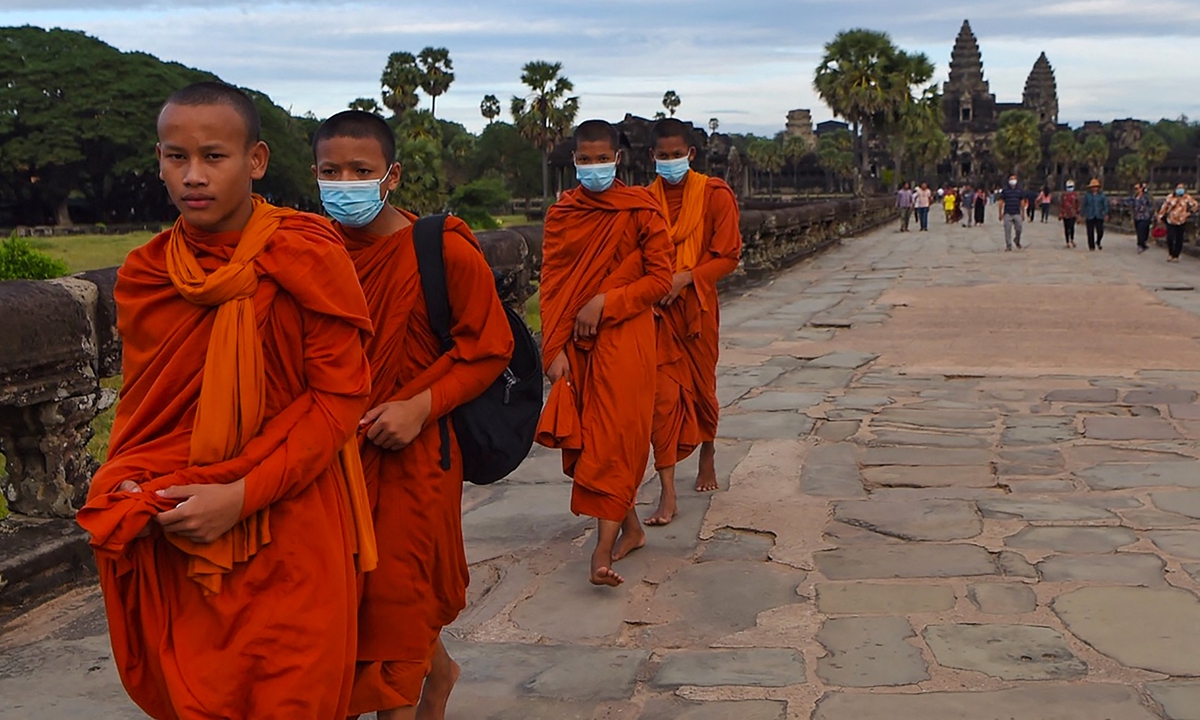
Tourists ride on cyclos pass the Independence Monument in Phnom Penh, Cambodia. Photo: AFP
Cambodian Prime Minister Samdech Techo Hun Sen on November 14 announced quarantine-free travel for all fully vaccinated inbound passengers after most of the country's population have been vaccinated against COVID-19.
The quarantine-free travel took effect from Monday, he said in a special audio message released publicly.
"As almost 88 percent of our total population have received COVID-19 vaccines, so quarantine requirements are not needed anymore," Hun Sen said.
"Both Cambodians and foreigners traveling to Cambodia will be no longer required to go into a quarantine, but those, who have not been inoculated with COVID-19 vaccine, will be required to undergo a full 14-day quarantine," he added.
However, all inbound passengers' samples will be taken for polymerase chain reaction tests upon their arrival in the kingdom, and they can wait for the results at their own residences or the homes of their friends or relatives, he said.
"When the results show that he/she is negative for COVID-19, he/she has right to travel to wherever he/she wants to," he said.

Tourists visit Angkor Wat in Siem Reap province, Cambodia. Photo: AFP
The latest move came after the Southeast Asian nation has administered at least one dose of COVID-19 vaccines to 14.05 million people, or 87.8 percent of its 16 million population, according to the Ministry of Health (MoH).
Of them, 13.2 million, or 82.5 percent, have been fully inoculated with both required shots, and 2.02 million, or 12.6 percent, have received a third dose or a booster dose, the MoH said.
Lim Heng, vice president of the Cambodia Chamber of Commerce, welcomed the quarantine-free policy, saying that it would encourage investors and tourists, especially from China, to come to Cambodia.
"It's a good opportunity to attract both foreign investors and tourists to our country, as some countries still impose travel restrictions, and I believe that foreign tourists, who are boring during the COVID-19 era, will come to Cambodia for leisure," he told Xinhua.
"This full reopening for vaccinated inbound travelers clearly shows the Cambodian government's great success in its vaccinations against COVID-19, with China being the key vaccine supplier," Heng said.
Chhay Sivlin, president of the Cambodia Association of Travel Agents, said the move would give a big boost to the tourism industry, which had been hit hard by the pandemic.
"It's exciting news for tour and travel operators as well as for other tourism-related businesses, and we're confident that this quarantine-free policy will reboot our tourism growth after a slump for nearly two years," she told Xinhua.

Buddhist monks walk in the Angkor Wat compound. Photo: AFP
She attributed Cambodia's success in fighting against COVID-19 to "the Cambodian government's wise leadership and China's timely and regular supplies of vaccines."
Travel restrictions imposed to tackle the pandemic put the brakes on Cambodia's burgeoning tourism industry - revenue plummeted to $1 billion last year, down from nearly $5 billion in 2019, when the country attracted 6.6 million visitors.
The reopening decision overrode the previous reopening plan, under which popular beach spots Sihanoukville and the island of Koh Rong, as well as Dara Sakor - a Chinese-developed resort zone - were set to welcome visitors from November 30.
And the reopening of Siem Reap - the gateway to the world heritage-listed Angkor Wat complex - is brought forward from January.
Hor Sophea, a tour guide at Angkor Wat, welcomed the move.
"It is a positive step for the survival of our tourism," she told AFP.
"This is a good decision because when more tourists return then I can sell more of my things and feed my children," said 75-year-old Men Vanna, who owns a painting and souvenir shop.
"More tourists coming into the country the better for my business."
Cambodia was spared the worst of the pandemic in 2020, but has recorded the bulk of its nearly 120,000 cases since April this year.
Last year, Cambodia welcomed 1.3 million foreign arrivals, with tourism receipts of about $1 billion, government data showed. That compared to 6.6 million arrivals and $4.9 billion in 2019.






